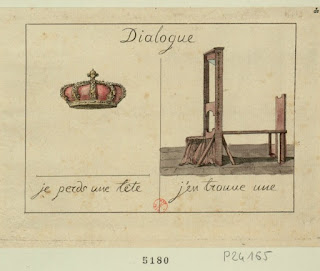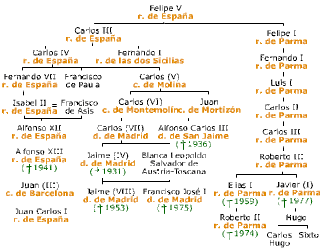Revolución americana, revolución francesa, oleadas revolucionarias...
Final del siglo XVIII y siglo XIX
Ya tienes una primera experiencia narrando los acontecimientos de la Revolución Americana
Mira este vídeo https://www.youtube.com/watch?v=eIYLUC4ovGI sobre la Revolución Francesa
Toma nota, porque pronto te tocará a ti
martes, 31 de octubre de 2017
domingo, 29 de octubre de 2017
Proyecto: Rutas medievales. Cruzadas y Comercio
MUSIC + SOCIAL
SCIENCES PROJECT
Group work: creating
a radio documentary about medieval routes: Crusades and trade
A radio station has asked you to create a radio documenary
about different routes in the Middle Ages: Crusades and trading routes.
You will prepare (1 per group):
1.
A written script
2.
Information sheets (cards). One for each section
3.
A glossary
4.
The audio file (radio documentary)
Your radio documentary should include the following
elements:
-
A title
-
A tune (your own composition)
-
A general presentation
-
An introduction
-
Reports with specific information
-
Interviews
- Advertisements
-
Music
-
Sound effects
Deadline: Tuesday, 21st of november (11
lessons)
The Script, information sheets and
glossary will be handed in in class
The radio documentary will be sent
via Edmodo (until 10 pm)
CONTENTS:
-
Routes (geographical description, climates,
cities, modern contries, etc.)
-
Means of transport (length of journeys,
illnesses, etc.)
-
Trading products
-
Kingdoms, empires, etc.
-
Religions
-
Languages
-
Artistic styles, monuments
-
Music, dance, instruments
-
Conflicts, battles, etc.
-
Weapons
-
Hate, violence
-
Dates, characters, events
Evaluation:
-
The tune, Audacity edition and information
related to music will contribute towards your Music grade
-
Information about general medieval issues will contribute towards your Social Sciences grade (30%)
This Project will be assessed on
the following criteria:
-
Daily work: daily research, bringing materials,
giving ideas, hands-on work
-
Concentration, cooperation, daily work developed
in english language
-
Historical information (specific deep
information about all of the contents. Proper vocabulary
-
Self created contents (never copy and paste or
read)
-
Original program design
-
Audible voices, music and effects
cComenzamos el trabajo. ¡¡Manos a la obra!!
These are our teams:
cComenzamos el trabajo. ¡¡Manos a la obra!!
These are our teams:
Lesson number 1 (29-10-17): Project explanation. Creating teams. Dividing roles.
Lesson number 2 (30-10-17): Find the pages in your textbook that include the contents of your project. Share the tasks
Lesson number 3 (6-11-17): Bring your mental maps. Share them with the group
Lesson number 4 (7-11-17): Review and correct your mental maps (homework). Bring information that you can not find in your textbook. Speakers will report about specific difficulties and needs.
Lesson number 5 (8-11-2017): You get your graded mental maps back. In groups, design the radio documentary:
A title*
- A tune (your own composition)
- A general presentation*
- An introduction*
- Reports with specific information **
- Interviews **
- Advertisements*
- Music
- Sound effects
* * You will work on this in group during the lessons
** You will prepare this part individually
Lesson number 6 (13-11-2017) Bring your individual script** (homework)
Ñesson number 7 (14-11-2017) All individual scripts will be revised. A general structure should be clear by today. Teams will work on the common parts during the lesson
Lesson number 8 (15-11-2017) Prepare everything to get ready to record during the weekend
Lesson number 9 (20-11-2017) Everything is already recorded. Work on last details
You will be graded according to this rubric:
* * You will work on this in group during the lessons
** You will prepare this part individually
Lesson number 6 (13-11-2017) Bring your individual script** (homework)
Ñesson number 7 (14-11-2017) All individual scripts will be revised. A general structure should be clear by today. Teams will work on the common parts during the lesson
Lesson number 8 (15-11-2017) Prepare everything to get ready to record during the weekend
Lesson number 9 (20-11-2017) Everything is already recorded. Work on last details
You will be graded according to this rubric:
RUBRIC
C Poor
|
C/B Enough
|
B Good
|
A Very good
| |||||
Written script is well presented
| ||||||||
Information sheets are well presented
| ||||||||
Glossary is complete
| ||||||||
The audio file is sent on time
| ||||||||
The audio file is easily audible
| ||||||||
It has an original title
| ||||||||
There is a general presentation
| ||||||||
There is a general introduction
| ||||||||
Individual reports with specific information
| ||||||||
Self created contents
| ||||||||
Sections where there is interaction among the team members
| ||||||||
Extras
| ||||||||
Daily work
| ||||||||
After having finished the project, students send the radio documentary via Edmodo to the teacher and hand in their portfolio with all of the documents.
It´s time for a evaluation... Let´s do a fun one!
miércoles, 25 de octubre de 2017
Calificación 2º ESO
Se valorarán los siguientes aspectos:
- El trabajo diario en casa y en el aula.
-
La participación activa en la dinámica de las clases.
- Las pruebas escritas
- Los proyectos individuales / grupales
-
La actitud ante el trabajo y las relaciones con los demás miembros del grupo de
clase.
martes, 24 de octubre de 2017
La península arábiga en el siglo VI. Tribus y Mahoma
¿Qué población había en la Península Arábiga en el siglo VI, antes de la figura de Mahoma?
Tribus del interior
Nómadas
adoración de fetiches
Tribus del interior
Nómadas
adoración de fetiches
Tribus de la costa
Sedentarios
politeístas
comerciantes
¿Qué tenían en común?
La lengua: el árabe
La lengua: el árabe
Adoración de la Kaaba (piedra negra)
Surgen algunas preguntas interesantes:
- ¿Aparece la figura de la Virgen María en el Corán?
- ¿Qué diferencia hay entre un ángel y un arcángel?
- ¿Por qué seguimos el calendario cristiano si España es un país laico?
lunes, 23 de octubre de 2017
El calendario cristiano se rige a partir de la fecha del nacimiento de Jesucristo.
El calendario islámico se rige a partir de la fecha de la Hégira (622 de nuestra era).
Aquí hay una aplicación para calcular la fecha en el calendario islámico:
https://es.calcuworld.com/calendarios/calcular-calendario-islamico/
El calendario islámico se rige a partir de la fecha de la Hégira (622 de nuestra era).
Aquí hay una aplicación para calcular la fecha en el calendario islámico:
https://es.calcuworld.com/calendarios/calcular-calendario-islamico/
domingo, 22 de octubre de 2017
Fiestas Nacionales, regionales, locales... tipos y razones para elegirlas
12 Octubre 23 abril 8 Septiembre 1 mayo 8 diciembre 1 enero 6 enero 6 diciembre 14 julio 4 julio
Son días festivos, no trabajamos.
¿Por qué ese día y no otro?
¿Qué se celebra?
¿Desde cuándo?
¿Se van a celebrar siempre?
¿Estás de acuerdo con las fechas elegidas?
¿Qué otras fechas habrías elegido tú?
El día de la muerte de Franco
Las fiestas religiosas rigen el calendario escolar. ¿Por qué? ¿Desde cuándo? ¿Estás de acuerdo?
Tipos de festividades:
A.
Nacional
Regional
Local
B.
Civil
Religiosa
Asalto a la Bastilla, 14 julio 1789
Son días festivos, no trabajamos.
¿Por qué ese día y no otro?
¿Qué se celebra?
¿Desde cuándo?
¿Se van a celebrar siempre?
¿Estás de acuerdo con las fechas elegidas?
¿Qué otras fechas habrías elegido tú?
El día de la muerte de Franco
Las fiestas religiosas rigen el calendario escolar. ¿Por qué? ¿Desde cuándo? ¿Estás de acuerdo?
Tipos de festividades:
A.
Nacional
Regional
Local
B.
Civil
Religiosa
Asalto a la Bastilla, 14 julio 1789
lunes, 16 de octubre de 2017
Guerra de Sucesión española. Siglo XVIII
De la casa de los Austrias o Habsburgo a la casa de los Borbones
Un rey muy guapo, otro ultracatólico, otro un poco "pallá", un Emperador criado lejos de Castilla, el máximo representante del Despotismo ilustrado en España, etc.
Una guerra
Aquí está el árbol genealógico:
Un rey muy guapo, otro ultracatólico, otro un poco "pallá", un Emperador criado lejos de Castilla, el máximo representante del Despotismo ilustrado en España, etc.
Una guerra
Aquí está el árbol genealógico:
Geacron. Mapa histórico interactivo
Trabajamos en clase con esta herramienta:
Geacron está disponible en español y en inglés
Se trata de un mapa histórico digital.
Sorprendente y muy útil.
Geacron está disponible en español y en inglés
Se trata de un mapa histórico digital.
Sorprendente y muy útil.
lunes, 2 de octubre de 2017
Byzantine Empire. Mental Maps
You are learning how to make mental maps from the information you have in the text book.
The way to learn it is practicing.
Here you have some examples of mental maps. Compare them to the ones you have made yourself.
Is there something you need to change or/ complete?
The way to learn it is practicing.
Here you have some examples of mental maps. Compare them to the ones you have made yourself.
Is there something you need to change or/ complete?
Suscribirse a:
Entradas (Atom)






























